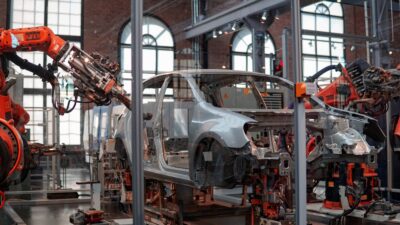Sydney Business Insights and Sydney Policy Lab

James Crabtree on India’s billionaire raj
With the rise of a billionaire superclass from the austere remnants of India’s state socialism, how will India handle rising inequality?
Associate Professor James Crabtree from the Lee Kuan Yew School of Public Policy joins Dr Sandra Peter to discuss leapfrogging, happiness and state capacity.
The Future of Power series is a collaboration between the Sydney Policy Lab and Sydney Business Insights.
Shownotes
The Billionaire Raj: A Journey Through India’s New Gilded Age, James Crabtree’s new book, a vivid account of a divided society on the cusp of transformation
World Inequality Report 2018 by the World Inequality Lab
World Happiness Report: rankings of happiness prepared by the United Nations Sustainable Development Solutions Network
Why Nations Fail by Daron Acemoglu and James Robinson
James Crabtree at Google Talks on the billionaire raj
You can subscribe to this podcast on iTunes, Spotify, Soundcloud, Stitcher, Libsyn, YouTube or wherever you get your podcasts. You can follow us online on Flipboard, Twitter, or on sbi.sydney.edu.au.
Sydney Business Insights is a University of Sydney Business School initiative aiming to provide the business community and public, including our students, alumni and partners with a deeper understanding of major issues and trends around the future of business.
Creating new, dynamic partnerships for change between The University of Sydney researchers, policy-makers, campaigners and broader community.
Share
We believe in open and honest access to knowledge.
We use a Creative Commons Attribution NoDerivatives licence for our articles and podcasts, so you can republish them for free, online or in print.
Transcript
This transcript is the product of an artificial intelligence - human collaboration. Any mistakes are the human's fault. (Just saying. Accurately yours, AI)
Intro This podcast is part of a collaboration between Sydney Business Insights and the Sydney Policy Lab at the University of Sydney, a series in which we explore the future of power.
Audio "So your family is like, rich?" "We're comfortable." "That is exactly what a super-rich person would say."
Sandra V/O I'm Sandra Peter. I'm the Director of Sydney Business Insights. The movie Crazy Rich Asians was a hit at the box office. But there is another story about the insanely rich Asians that's not fabulous, and it's not a fantasy.
James My name is James Crabtree, I'm an Associate Professor in Practice at the Lee Kuan Yew School of Public Policy in Singapore. And I'm also the author of a new book about India, which is called The Billionaire Raj - A Journey Through India's New Gilded Age.
Sandra V/O James Crabtree spent five years in India for the Financial Times, and his book, The Billionaire Raj, is a gripping, true tale about the rise of a billionaire superclass from the austere remnants of India's state socialism.
James India was going through a huge growth spurt, and the number of billionaires, as an indicator of this, was going through the roof. So there were only two in the mid 1990s. This had gone up to 120. They were worth three billion dollars when there were two of them, now they’re worth 450 billion dollars, more billionaires than anywhere in the world apart from America and China.
Sandra V/O Crabtree's book contrasts the lives of this tiny but super-rich enclave with the dire poverty of a billion Indians. Crabtree also argues that such extraordinary inequality, if not addressed, will be disastrous for India's long-term prosperity. Big income gaps are also bad for a nation's soul. Significant wealth gaps in a country are a strong predictor of political, economic and social catastrophe. And that's not just my opinion, that's the conclusion of the World Inequality Report, co-authored by more than 100 economists across five continents. Another global study, the World Happiness Report, has the egalitarian Scandinavian countries of Finland, Denmark and Norway, slugging it out for the accolade of being the 'happiest places on earth'. In its latest report of 156 countries, India is ranked at 140, well below China at 93. Australia comes in at 11. In his book, Crabtree draws comparisons with late 19th century United States, where a handful of monstrously rich tycoons colluded with corrupt politicians in a period of bare-knuckled capitalism. Mark Twain called this period America's 'Gilded Age', where rapid advances in technology and a dynamic economy was also a time of excessive consumption and corruption in public life. Political reforms and massive social pressures on the part of trade unions and other community-based organisations eventually saw the economic benefits shared more widely, and the US championing meritocracy as a core national value. The question facing India is will it be able to bring about political, regulatory and social changes that could usher in an era of broad-based prosperity? If it can't, then what will happen to the world's largest democracy and soon to be most populous nation on earth?
Sandra James, welcome and thank you for talking to us today.
James Thank you, very nice to be here.
Sandra You spoke about the rise of inequality in India, and you used this rise in the number of billionaires as a cautionary tale. Why is inequality a problem?
James So there's a discussion in India which tends to go a little bit like this: People on the right say inequality doesn't really matter. What matters is how fast growth is, and how fast we can industrialise. And therefore, people getting very rich is a great thing. And there's something to that. I mean, I don't have a particular problem with people who make fortunes by building world-class businesses, exporting and being competitive, creating better products. And the nice thing about India is sometimes people talk about the distinction between the good and the bad billionaires in India. Most of the ones I write about in my book are the bad billionaires. But there's plenty of good billionaires, too, in IT services, in generic pharmaceuticals, in the auto components supply chain. But you have bad billionaires, and these tend to be the ones who are practitioners of a certain kind of crony capitalism. They're not idiots. They're often very good businessmen, but they get an extra yard of advantage by working the system to their benefit. So what does that mean about inequality? Well, it means you have some people in India who are making a small fortune in ways that are not entirely honest. And the second side of that debate that I mentioned, the people who are more concerned with the sort of state of the poor in India, they tend to have looked only at the condition of those at the bottom. But in the aftermath of the financial crisis, there's been really quite compelling research done that the gap between the top and the bottom, and the size of it matters a lot, both from a moral point of view, but also from a business point of view. So if you want to industrialise quickly, and in particular if you want your government to introduce the kind of economic reforms that will allow you to do that, then a degree of social equality, a more egalitarian society, is quite helpful. That was what happened in the Asian Tigers, which were much more egalitarian than India is now, particularly so Japan and Korea, but to a lesser extent, some of the other economies in East and Southeast Asia. And so there are lots of reasons to be worried about inequality. There's lots of literature about the fact that if you live in a very, very unequal society, you're less happy, you have less good health outcomes, all sorts of things. But for an audience like yours who are people interested in business and commerce there's also, I would argue as a former business journalist, there's a good business case to be made that you should be worried about real extremes of inequality.
Sandra Who is now in a position to do something about this? If we think about inequality, is this something for the government, or is there something that the Indian economy will take care of?
James No, I think the risk is actually the opposite. So India remains quite a poor country. So it has a lot of rich people in it, but the average Indian only earns nearly less than 2000 dollars a year. So, you know, in China, that's nearly 12000 now. So India is a long way behind. And I think the risk is that countries tend to get more unequal before they get less. That tends to be a kind of rough law. And so the risk for India is at the moment, it is already one of the most unequal countries in the world and it has been getting less equal quite quickly. And the risk is if it goes on for the next 10 or 15 years, as it has for the last 10 or 15 years, it will be in a really unprecedented position, even potentially worse than somewhere like Brazil or the Latin American economies that are famous for their yawning inequality. Who has to do something about this? I mean, I think you're right basically that this comes down to action in some sense by the state. It's not a simple process, I mean, you partly need to make sure that the rich are paying their fair share, whether those are the very rich or corporations in India, tax payments are not widely shared. But it's also about building the kind of state that you saw in East Asia, the East Asian miracle was not one of unfettered market capitalism. It was one in which people coming off the land, farmers, were given education and basic healthcare and some degree of pensions and Social Security that then allowed them to work in labour-intensive factories run by large global companies making smartphones or semiconductors or whatever it might be. And so in a sense, this is something where you have to have business and government playing a role together. But the lesson is that political reforms in a sense have to be led by the state, by politicians. And political reforms tend to be slightly easier to conduct in societies that do not have enormous inequalities of wealth and income.
Sandra Do you see education as the key to developing a middle class that is sorely lacking in India? If we look at a place like China, there is a very, very large middle class, whereas in places like India, the middle class has shrunk.
James Well, I think it's easy to say education is the key, that's sort of thing politicians say. I mean, I actually think 'the key' is something a bit more general than that, which is what they call state capacity. So developing the ability of your government to regulate the market effectively so that companies can grow and prosper, but also make sure that taxes are collected, build good public services that are efficient and that help people have a measure of security. You know, you're not talking about making the leap from India to Denmark in one go. You have to be realistic about this. But you're talking about gradually as countries in East Asia did, building a state that helps people get along. And education is obviously a big and important part of that, but so are a lot of other things, health, power, water. Education is a particular challenge in India because for your audience, actually, they will meet lots of very clever Indians, either Indians from India or the Indian diaspora. And so there is this sense that the Indian education system works reasonably well for a developing economy. And that is true at the absolute zenith of it, in the, they're called the Institutes of Technology. So India is very, very good at taking, of its one point two billion people, finding brilliant mathematicians and engineers and kind of catapulting them up into the global stratosphere. India is also, you know, phenomenally good in the diaspora population. So here in Australia, in America, Indians tend to be the richest, best-educated part of the population quite often. But at home in India, the education system is very bad. The basic schooling system is poor, to put it mildly. Most of the universities outside of that really elite group are quite poor.
Sandra V/O While the story of bad billionaires in India is fascinating, it is actually part of a bigger story dealing with an important idea in economic prosperity. The idea is summed up by the term 'state capacity', and it's both an economic and philosophical discussion that goes to the moral purpose of government.
Sandra I want to take you back for a second to that idea of state capacity, because we've seen the debate in places like Australia and the US and the UK. It's always about small state versus big state, small government versus big government, whereas you chose to speak about building state capacity. What is it and how does India go about doing this?
James So state capacity is a very interesting idea. I mean, I draw in this quite a lot on the work of James Robinson and Daron Acemoglu who wrote a book called Why Nations Fail that many of your listeners would be familiar with.
Sandra V/O OK, so you may not be familiar with this book. Published in 2012, Why Nations Fail is a highly influential analysis of the conditions that cause some countries to prosper, and others to fail.
James And it makes the argument that why countries develop is not because they have a great climate or they have, you know, Protestant values, or that they're in a particularly advantageous position next to a port or something like that. What matters is institutions, and the countries that develop well are those that develop neutrally-run high-quality institutions that do not favour one group over another, and do not extract resources in favour of either the elite or some minority. So think about your traditional image of a kind of stereotype African kleptocracy. That's the problem. And then think of Singapore and that's the answer. Singapore has nothing very much, it does have an advantageous geography, but basically why Singapore grew rich was because it developed a very high quality state very, very quickly. And that's what they mean by state capacity. So state capacity means the ability of the state to do things, and also the ability of the state to convince its people that it is acting in its own best interest. So China is an example of a state that actually has quite high state capacity, but which at the moment is probably declining, because as Xi Jinping becomes more authoritarian, then the risk is that people are going to kind of bristle against that. And the Chinese state is going to have to spend more money and energy and effort coercing its people to do things that they might not want to do. So in addition to simple functional things like 'can you raise an army?' Or 'can you build a sewer?'. There's also a question about legitimacy. A state that has very high capacity tends to be one that the people believe in. So why that rather than the big or small state? Well, in the case of India, it's very contradictory. There are some areas in Indian life where the state is clearly too big. It runs a really hopeless national airline and a bunch of other state-run industries that it shouldn't be running, there's no reason for them to run those, they're not strategic in any meaningful sense. It fiddles around in all sorts of areas, particularly if you're business, that it shouldn't do, it's far too intrusive. But there are lots of areas, you know, education is one, where the state should be there with bells on, but it's largely absent. And so the traditional American, British, Australian argument about the big and the small state is not very helpful in that context, where in some areas India's state needs to be much bigger. And in some areas, it needs to be much smaller. But in all areas it needs to be better, it has to have higher-quality people and pay them better and to be more accountable and to be more transparent, to be more technologically enabled, which is one area where, you know, there's some reason to be optimistic. But I think the big/small debate is to some degree a bit of a cul-de-sac, and state capacity is a better place to start.
Sandra Let me take you then to technology, because you said there's reasons to be optimistic there. China has made significant investments into technology, whether that's artificial intelligence or surveillance, facial recognition, social credit score and so on, to actually help build that state capacity. How is India doing this differently? Is India well positioned, actually, to take advantage of the next industrial revolution?
James So India's position is a different one from China. It's starting further back, as it were. China has been investing in a certain kind of state capacity for a generation now, and India is only really beginning to do that. So inevitably, it's much less good than China in all sorts of ways. And so there's a sort of basic level of function that needs to be built up. One of the problems in India is, so Narendra Modi, the prime minister who won in a landslide election in 2014, is very keen on technology. He sort of loves smart cities and smart nation and that sort of thing. What India needs to be doing, if it wants to develop urbanisation is to do the basic things right, like city planning, municipal sewerage, basic things that you need to do to expand a city. But what Modi is obsessed with is a kind of Singaporean vision of a smart city where you have Wi-Fi on buses and facial recognition technology. And so there is a danger, I think, in India that you can get distracted by frontier technology, when what you need is something that's appropriate for a country that has a GDP per capita of eighteen hundred dollars as opposed to sixty thousand dollars. It is a great advantage that India is developing at this moment. It has two advantages, one of which is it's a late developer so it can learn from everybody else, in theory. And also it does have technology that allows you to do completely new things. So they have their, it's called Aadhaar, their biometric identification database, which now has biometric identifiers for more than a billion people, that allows you to do amazing things. For instance, you can put benefits into bank accounts which are linked to mobile phones. You know, it's not something you could have done in South Korea in 1965. So India has certain advantages. But I am a bit suspicious of some of this, I have to say. Indians talk about 'leapfrogging', namely the notion that as Indians move from a situation where nobody really had a phone to everyone having a mobile phone without the interstitial phase of most people having a landline phone. Or they're also going to leapfrog over something like big box retail, there isn't really going to be big box retail in the manner that we know it in the West. India will move in one leap from small corner stores to e-commerce, Amazon and Flipkart and that kind of thing. But the notion that you can leapfrog everything by clever investment in technology, I think is rather dangerous, for exactly that point about Wi-Fi enabled buses, that you think you're going to get to Singapore by investing in Wi-Fi enabled buses and you sort of forget about all the hard grind of building basic state capacity, educating your people. The things that you can't do with apps and smartphones, which are most of the things that matter, are the things that you're in danger of forgetting. So technology is an advantage, but it has to be used carefully and selectively, and you shouldn't forget the hard grind of development is not something that can be solved, you know, with an app and a 4G connection.
Sandra We know there is a real risk in technology actually leading to rising inequality from the fact that we see, and even with a platform like Uber, there's a gender pay gap between women and men drivers. But in India, there seem to be very few instances of Indian-grown companies that would try to use technology to solve some of these problems. You've mentioned Flipkart, but there are not many Indian unicorns out there. And mostly when we talk of technology in India, we mention WhatsApp, we mention Google, we mention Facebook. Whereas in a place like China, it's the Baidus, the Alibabas, the Tencents, the Didis, that dominate the landscape.
James It’s not always clear that this is the case, but it's not immediately clear to me that the Chinese model is superior. And also the Chinese model is wrapped up in a kind of state authoritarianism that has all sorts of other problems. So I think India's technology sector is a great strength. Now it is true you haven't seen the development yet of a kind of Alibaba for India. But you have to remember, India is a much poorer country than China is. And in a sense, the expectations that India's e-commerce sector is going to follow China's hockey stick growth were always unrealistic. Earlier in the podcast, you mentioned India's middle class, India's middle class is tiny, it's probably 20 million people out of 1.2 billion who have a lifestyle that your listeners on this podcast would recognise as middle class, meaning savings in the bank, they drive a car, they have a decent education, they go abroad for holidays. The people who do that is super-tiny subset of the Indian population. To be middle class in India means maybe you're about to buy a scooter, and you might have a television at home, you know, but it's a whole different kettle of fish. And also India has still pretty crummy infrastructure. And many of the big e-commerce brands that you're talking about, they don't just exist in thin air. They need to have cold chain logistics, they need warehousing, they need to deliver things on roads. And so India faces, by virtue of the place it comes in its development path, barriers that even the wizardry of technology and, you know, machine learning can't solve the fact that India doesn't have a national address system. And so you need to kind of find a way to literally deliver people parcels, when you don't have an address that works. And so I think India's development as a technological economy has real challenges. But there is a depth there, in Bangalore, in Hyderabad, amongst the Indian elite, the software engineers, that is going to be, you know, it's an unquestionable advantage to India in the medium term. But it's not realistic to suggest that India is going to follow China as quickly as the growth of China's Internet economy in the 2000s.
Sandra Your book revolves around issues of inequality and corruption in India. But a lot of the Western nations are dealing with similar problems. We've seen the rise of Trump in the US, we've seen the Brexit conversation in the UK, Australia as well is struggling with a lot of questions around inequality. In our attempts to reduce inequality in our neck of the woods, are we actually making things worse for places like India, and does reducing inequality in the US or in the UK or Australia come at the expense of rising inequality in India?
James So this is a fascinating and complicated and morally interesting question. So in some ways, let's imagine you were able in Australia or the US or the UK, you were able to boost the incomes of the poorest 20 percent. Then in some sense you have to assume that they would then spend more. That would in some sense filter over into imports and the sorts of things that they're importing. Garments, electronics are often made in countries that are at the bottom end of the food chain. And so there could be a case for saying that tackling inequality in the West might be good for the developing world. But there's a more complicated question, which I think is what you're pointing at, which relates to the way that these countries integrate themselves into global supply chains. And so the famous example is East Asia. India is actually rather less good at this. But countries like Singapore, Taiwan, South Korea got rich in part because they were able to integrate themselves into global manufacturing supply chains, and that was what created the low skilled and then high skilled factory jobs that allowed their people to move off agriculture, and into offices and factories and onwards and upwards to becoming a country that looks functionally very similar to Australia or the US. The question is, if you dig some measures to push back a little bit about globalisation, if you think that some mixture of globalisation, and in particular technology, have been the forces driving inequality in the rich world. Well, those have also been the forces that have been helping growth in the poor world. So why has China managed to take nearly half a billion people out of poverty, India, some hundreds of billions? It's mostly because they reintegrated into the global economy with a vengeance. Now, in some senses, that has had effects on inequality, but it's certainly helped growth. And so if you begin, you know, as some on the left would like to do, but also as President Trump would like to do on the right, to kind of decouple the advanced industrialised economies from globalisation, then the effect of that will be very complicated and disruptive in all sorts of ways. But one of the things it might do, is it might be less good for those parts of the developing world that are integrated into the world economy. And those tend to be the best parts of the developing world, they're the higher skill, most productive parts of the economy. And critical to the East Asian model in particular was the fact that the discipline of exporting was what made you competitive, that was what helped raise the bar everywhere was that you threw yourself into the global economy and through that process you kind of toughened up and you became world class in whatever it might be, auto components, semiconductors, you know smartphone components, whatever it is.
Sandra Do we have good public narratives to engage people in this? What I'm thinking now is that after the Second World War or after many of our financial crises, at least in the West, we've built good public stories that people could get behind and participate in public discourse. But we seem to be failing recently to either give the world or give nation states these stories beyond nationalistic stories.
James There's been no policy innovation at all, really substantiative, I mean, there's been a discussion about universal basic income, which has been the kind of equivalent of that, where that in a sense is the answer to this question, but it's not a very realistic answer. No one has gone down that route. And in the gap between doing nothing and chattering about universal basic income, there's been very little innovation in the areas that you need to try and solve this problem, which is how do you manage to keep some of the gains of a more open global economy that is efficient and that makes things more cheaply and allows people to have the things that they want, but which doesn't come at the cost of jarring disruption that ordinary people don't like, or kind of change that is completely decentring. And more of that is to do with technology than it is to do with globalisation and outsourcing and offshoring. But nonetheless, I think that those of us who kind of care about, about this, about how do you reimagine the state and the social compact in order to support a continued era of, if not more global integration, then sort of something akin to what we've got now, because it's more efficient for us in the West and it's certainly better for the developing world, have done an absolutely lousy job of trying to think through what that actually means and coming up with the kind of radical policy solutions which will help not just compensate the losers, but make people who might be affected by change enthusiastic about what comes next, about the fact that they can have a better future tomorrow than they have today. And I think this has been a total failure, really, and something that requires a lot of soul searching, if we are not, in a sense, just to cede the ground to Trump and Erdogan and Putin and the bad guys who want to take us back to an entirely different world.
Sandra What are the types of things that you think live in that gap?
James Well, so you learn from the best. And so some of the best solutions to this come in traditional old fashioned social democratic models in somewhere like Scandinavia. So I have a lot of time for, for instance, the Danish flexicurity model, which has a relatively flexible labour market with very high standards of benefits for people who are affected by labour market change. And so they have a bargain which says 'we're not going to protect you perhaps as much as you would like. But if you are affected by some kind of industrial change, then we are going to support you through that change in a way that is very generous, that we're not going to kind of put you on unemployment that's a sort of, you know, some miserly level. We'll give you your old salary and then some, and then we'll actively help you reskill'. But it's in other areas, too, reskilling was in the 1990s in the kind of Blair/Clinton era. This was seen to be the answer, and it clearly isn't. To some degree people don't like doing this. Nobody really wants to have to kind of, you know, 'you worked in a factory, now we tell you, you have to go work in a call centre'. No one wants to do that. So it's partly about how you help localities. In places like Singapore, they're looking at more technological solutions. So LinkedIn and the Singaporean government are trying to look at ways of using big data to analyse labour market patterns. So you can see much more quickly that, for instance, there's an oil supply shock, the price of oil goes down. And that means that people in the Singaporean oil supply services industry are going out of work. Now, so some of them at the frontier start moving from that sector to another. And you can see that on LinkedIn, because you sort of see where people are moving. And that suggests a certain kind of government intervention that maybe you can help more people do that by giving them appropriate, you know, so there's ways in which you can use technology. And I don't have all the answers to this, I mean, I think it's a very complicated question that just requires a lot more thought across urban policy, social policy, the way in which our education systems are built so that they're no longer around the four year degree when you are 19, but are about dipping in and out in education, in high-quality institutions throughout your career, whether it's, you know, Oxford or Cambridge or Sydney Uni. There's a whole range of things that we should be doing, and really, this discourse about how you reimagine a kind of enabling state to justify a new kind of fairer globalisation is in its infancy, if it's getting there at all.
Sandra Fantastic. Thank you so much.
James Thank you, that's very kind of you.
Outro Links to the books, articles and talks mentioned in this podcast are available in the shownotes. This conversation with James Crabtree is part of a collaboration between Sydney Business Insights and the Sydney Policy Lab. This podcast was recorded and edited by Megan Wedge, and researched and produced by Jacquelyn Hole.
Close transcript















